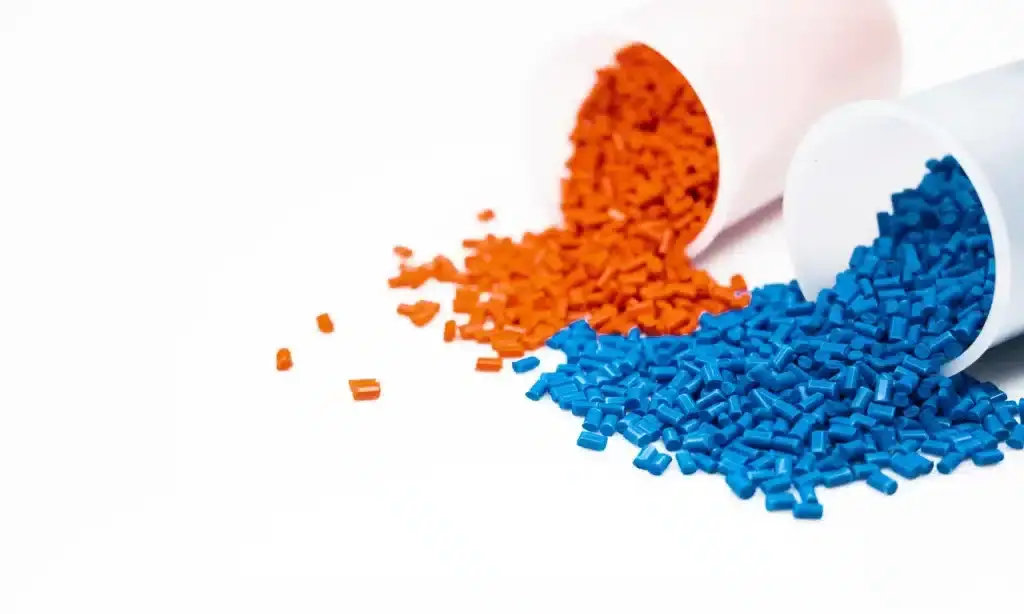
Plastic compounding is a manufacturing process that involves blending, mixing, and melting in an extruder of some type then pelletizing. Most compounding extruders purchased nowadays are of the twin-screw corotating/intermeshing variety, though counterrotating twins are used for some applications. Compounding extrusion lines are typically equipped with gravimetric feeding systems that dose materials into the extruders at precise rates. In certain applications, extruders are equipped with vent ports that pull unwanted moisture and other volatiles from the polymer stream. Polymers with various additives produce a material with specific properties tailored to particular applications. The process is commonly used in the plastics industry to create customized plastic materials that meet specific performance, appearance, and processing requirements.
Key Steps in the Plastic Compounding Process:
The process begins with selecting the base polymer, which could be thermoplastic or thermosetting. Common polymers include High-density polyethylene (HDPE), Low-density polyethylene (LDPE), polypropylene (PP), polyvinyl chloride (PVC), polystyrene (PS), etc.
Various additives are chosen based on the desired properties of the final product. These additives can include:
Fillers (e.g., plastic masterbatch, calcium carbonate, glass fibers) to enhance strength or reduce cost.
Plasticizers to improve flexibility.
Stabilizers to enhance heat and UV resistance.
Colorants for pigmentation.
Flame retardants to reduce flammability.
The selected polymer and additives are fed into a compounding machine, usually an extruder. The materials are mixed in the extruder under controlled temperature and shear conditions to ensure uniform distribution of the additives within the polymer matrix.
Inside the extruder, the polymer is melted, and the additives are thoroughly mixed into the molten polymer to form a homogeneous blend. The process may involve multiple mixing zones within the extruder to achieve the desired level of dispersion.
After mixing, the molten polymer blend is cooled down and solidified, typically by passing it through a water bath or air-cooling system. The solidified material is then cut into small pellets, which are the final compounded plastic material.
Quality Control:
The compounded material undergoes various tests to ensure it meets the required specifications, such as mechanical properties, color consistency, and thermal stability.
The compounded pellets are packaged and ready for shipment to manufacturers who will use them to produce plastic products through processes such as injection molding, extrusion, or blow molding.
Plastic compounding is used in various industries, including automotive, construction, electronics, packaging, and consumer goods. The ability to tailor the properties of plastics through compounding makes it a vital process in the development of new materials and products.
This process is crucial in creating materials with specific attributes like strength, flexibility, flame retardancy, or color, and it allows manufacturers to meet the diverse requirements of various industries. SAN Plastic performs a key role in plastic compounding with a wide range of polymer processing, SAN Plastic has the right expertise with an experienced team.
SAN Recycling is a company that specializes in plastic waste recycling. The company is based in the United Arab Emirates and has been in operation since 2010. SAN is committed to reducing the amount of plastic waste that ends up in landfills and oceans by providing a sustainable solution for plastic waste management.
The company offers a range of services related to plastic waste recycling, including collection, sorting, and processing of plastic waste. Sehr Al Nojoom collects plastic waste from various sources, including households, businesses, and industries. The collected plastic waste is then sorted and processed at the company’s recycling facility.
SAN Recycling uses advanced technology and equipment to process plastic waste. The company’s recycling facility is equipped with state-of-the-art machinery that can process different types of plastic waste, including PET, HDPE, LDPE, and PP. The plastic waste is shredded, washed, and dried before being processed into pellets that can be used to manufacture new products.
One of the main benefits of SAN‘s plastic waste recycling services is that it helps to reduce the amount of plastic waste that ends up in landfills and oceans. Plastic waste is a major contributor to pollution, and it can take hundreds of years to decompose. By recycling plastic waste, Sehr Al Nojoom is helping to reduce the environmental impact of plastic waste and protect the environment.
Lead Battery Scrap
Nickel Battery Scrap
PPCP Battery box Regrind
Hdpe Blue drum Regrind
PET Flakes
etc….
Copyright © 2023 All Rights Reserved by SAN Plastic Waste Recycling